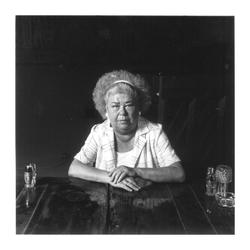
Patti Richards:
Old friend of Wardell Gray's
Section One:
Patti Richards:
Such controversy. I mean the air just got electrified. And we sat down. He
came off the bandstand he says you want to dance, because I was just a
little smart kid, I say sure. We get halfway around the floor and there
was this..and he says uh-oh and went back in ..because we were so used to
joking back and forth so there were no limitations in our house. You
could joke, you could laugh you could smack each other, whatever you
wanted to do.
Ready?
Well I think I was probably fourteen or fifteen
years old when Wardell was playing with Benny Carew at the Mayfair and
they had morning dances for the factory workers. And I used to skip study
hall in the morning, my father was a bartender at the bar so I knew all
the ins and outs and I'd run over there to listen to that band. And at
fifteen I had a wonderful crush on Wardell. I had a crush on his playing
which is..even at fifteen I knew was out of the ordinary. Wardell was an
out of the ordinary person, he was very very bright and very very funny.
He could be very very sarcastic. He had a way, he knew who he was and he
wasn't ashamed of who he was which made him pretty unique in those days.
All the musicians, my mother being one, recognized his extraordinary
talent and they were all..we had an open house. We had Black friends
before it was chic to have Black friends. They were in and out of our
house all the time, Wardell was in and out of our house,Paul Bryant, the
Carews, I used to babysit with their children. So there was no Black or
White situation it simply was a situation of who was the musician. That`s
really the way we judged everyone was on their ability not on their color.
Wardell's ability was above the average and he knew it because he used to
rear back once in a while and say that he played so much better then what
he heard, and why was he where he was. So I've never been sure because
everybody that was alive then, are all dead, so I don't remember exactly
how he went with Father Hines, but I do know that we did go down to the
Paradise Theater immediately to see him and then he came back to Lansing.
But I did get to see him after 1941 0r 42, I can't remember.
Section Two:
Abraham:
It's on, yeah....
Patti:
Wardell was not only ahead of his time musically but he was ahead of his
time as far as knowing who he was as a person. And absolutely refusing, I
can remember instances, in the forties, Black people had to know their
place and Wardell knew his, he knew who he was and he wasn't about to back
off or be treated unfairly if he could possibly stop it. I remember one
time we were all at a session and he was playing. And he came off the
stand and he wanted to know if I wanted to dance. He and I had almost a
relationship of people who are blood related because he teased me, he
smacked me and he was such good friends with my parents that we got up and
danced and about halfway around the floor he noticed the electricity
because in the forties this was just not done. So he couldn't really be
himself and neither could I. So the only time we could be happy was with
just certain few musicians who all felt the same way about each other
White or Black. It just, when they got together, when the families, and the
families all got together, it was different. So I enjoyed his attitude
because this was the attitude I was raised with. You didn't judge people
by their color, you judged by what you found inside of them. So, I
could see that Wardell in certain places would have a problem because
he didn't have that better know your place attitude. And I'm not too
sure he would have been quite vocal about it you know. And if not
vocal to the point of really causing a lot of trouble he would
have just walked away from the situation.